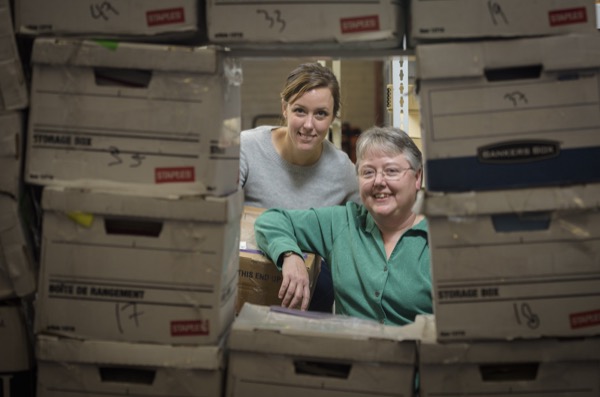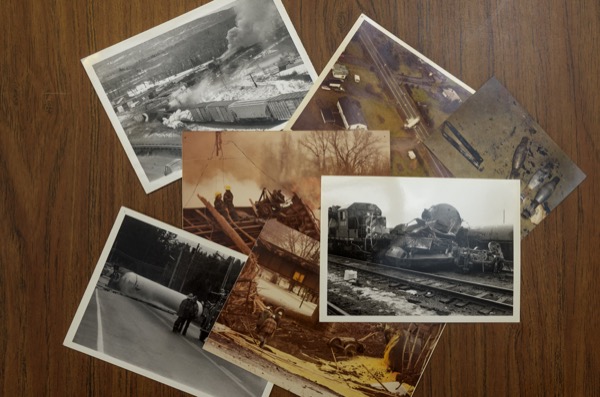


Disaster research
Resource collection at UD receives important scholarly papers
1:50 p.m., Jan. 13, 2016--T. Joseph Scanlon, a veteran journalist and respected journalism professor in Canada who became equally distinguished as a scholar in the sociology of disasters, had a longtime relationship with the University of Delaware’s Disaster Research Center (DRC).
The professor emeritus at Carleton University in Ottawa died in May, but his UD connection will continue, with his papers now housed in the DRC’s E.L. Quarantelli Resource Collection.
Campus Stories
From graduates, faculty
Doctoral hooding
The collection, a repository of some 70,000 items, is internationally known — like DRC itself — as a leading resource in the social and behavioral science aspect of disasters.
“Our collection is widely considered the premier collection of its focus in the world, and it’s heavily used by researchers,” said Pat Young, resource collection coordinator. “I get emails daily from around the world asking for information, and we typically have 10-20 visiting scholars a year making use of the collection.”
Prof. Scanlon’s children offered his papers to DRC, and 69 boxes have since arrived in Delaware, representing his prolific research and writing.
The T. Joseph Scanlon Collection, described as “vast and significant,” is being processed and preserved by Young, who will incorporate the papers, reports, data sets, photos, books and other materials into the resource center’s other holdings. Materials are not loaned outside DRC but are made available to any visiting researchers or agencies.
Young called the Scanlon Collection “amazing.”
“I don’t think Joe’s importance to the field can be overstated,” she said. “And now, to be able to provide this wonderful resource to future researchers is incredibly important and the best way I can think of to honor his memory and his legacy.”
Prof. Scanlon typically visited DRC at least a few times a year and had close collaborations and friendships with its researchers, stretching back to the early days of the research center, which was founded in 1963 at Ohio State University and moved to UD in 1985.
He participated in its 40-year and 50-year celebrations and conferences. At the 40th anniversary event, he presented a paper about DRC co-founders Russell Dynes and E.L. Quarantelli, both professors emeritus of sociology at UD, subtitled “Building on the Legacy of the Dynamic Duo.”
Prof. Scanlon’s family is pleased that his papers will be part of the DRC collection, said Meaghan Scanlon, one of his daughters.
"Dad always spoke highly of Delaware, and it seemed clear to our family that the DRC was the best place for his papers,” she said. “We're very pleased to know that his archives are being cared for so well and haven't doubted our decision to send the papers to Delaware for a single second."
Whenever Prof. Scanlon visited the UD campus, Young said, he had two primary goals: to connect with DRC faculty members and students and to make use of the resource center for his own research.
He thought of himself as a kind of honorary Blue Hen, she said, usually finding time to attend a UD basketball game or other sporting event while on campus and driving around Ottawa with a Blue Hen bumper sticker on his car.
He also contributed material to the resource center throughout his career.
Even before his family’s recent donation of his papers, the center housed more than 300 papers that Prof. Scanlon authored or co-authored. Young said his interests were wide-ranging, including the international response to disasters with mass casualties, and his scholarly work benefited from his expertise as a journalist.
“His interests were very broad, so we have a wide range of materials in his collection that we just would not have had access to any other way,” she said. “His background in journalism gave him a unique perspective, and it made him an amazing storyteller.”
More about the Disaster Research Center
The DRC is the nation’s first center devoted to the social scientific study of disasters.
Since the center’s founding in 1963, its researchers have established much of the basis for the field of disaster research, conducting some 700 field studies in the U.S. and around the world in communities devastated by natural and man-made events.
Today, the DRC is part of the College of Arts and Sciences, with core faculty members from the School of Public Policy and Administration and the departments of Sociology and Criminal Justice and of Civil and Environmental Engineering. Affiliated faculty from UD and other institutions represent the fields of history, English, environmental policy and political science.
Article by Ann Manser
Photo by Kathy F. Atkinson









